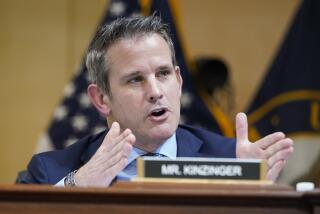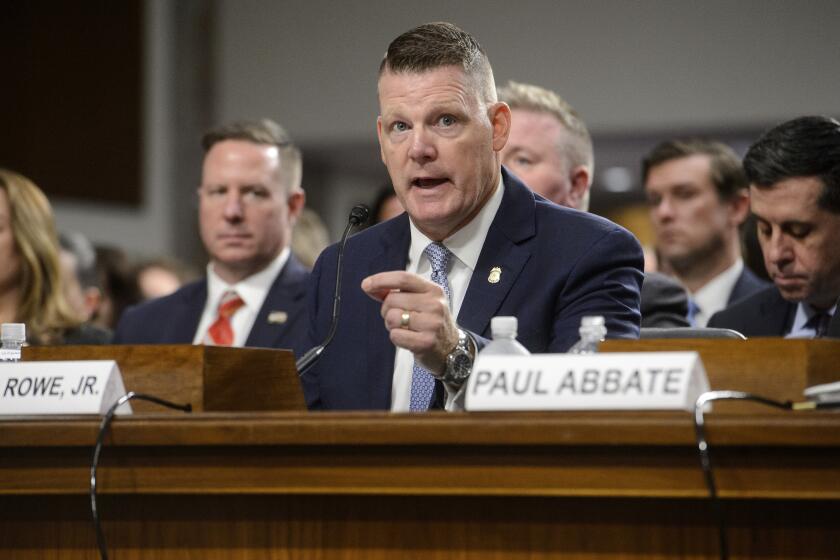Panel Debates First Lady’s Link to Records
A Republican member of the Senate Whitewater Committee demanded Tuesday that the panel confirm whether the fingerprints of First Lady Hillary Rodham Clinton were found on long-subpoenaed billing records, saying that, if true, she may be guilty of perjury or obstruction of justice.
The remarks by Sen. Connie Mack of Florida drew an immediate rebuke from Sen. Paul S. Sarbanes (D-Md.), who said that they represented “a gross unfairness” to the first lady because she may have handled the records during the 1992 election campaign to answer press inquiries about her law firm’s billing practices.
The exchange came on a day when a special panel of federal appeals court judges rejected a request from two Democratic senators to remove Kenneth W. Starr as Whitewater independent counsel because of controversy over his outside legal work.
The judicial panel, which appointed Starr nearly two years ago, said that it has “no power of removal over independent counsels.” Federal law permits only the attorney general to do so, the panel said, and the action must be for “good cause.”
In raising questions about the billing records, Mack referred to a Newsweek report, which quoted unnamed sources as saying that Starr’s office had found Mrs. Clinton’s prints on long-missing records that the White House relinquished last January, two years after they had been subpoenaed by federal investigators. The committee has heard testimony that copies of the documents from her former Little Rock, Ark., law firm were discovered in the White House living quarters by an aide to Mrs. Clinton.
Sarbanes, in responding to Mack, noted that Starr’s office had denounced the news leak. “I don’t think it does a service to anyone” to talk about possible felonies, Sarbanes added.
Mack suggested that the FBI agent who analyzed the records for fingerprints should be subpoenaed to testify but Sen. Alfonse M. D’Amato (R-N.Y.) suggested that might be inappropriate. Starr has been directing a grand jury investigation into the two-year lapse in production of the documents and the first lady gave closed-door testimony in January.
D’Amato directed committee lawyers to contact Starr to determine what information could be obtained about fingerprints.
“We should ascertain how we can go about getting that information and whether or not it’s accurate,” D’Amato said. “How did the records get there [in the White House living quarters] and when did they get there?”
After the exchange about the billing records, the committee continued the Arkansas phase of its investigation by examining whether Daniel R. Lasater, a millionaire entrepreneur and political fund-raiser, had enjoyed undue influence during Bill Clinton’s years as governor.
The panel focused on a state bond underwriting contract awarded to Lasater & Co., along with two other firms, that was first reported in The Times in March 1992. The $30.2-million contract, to finance a renovation of the state police radio communications system, was worth an estimated $750,000 to the underwriters, including Lasater, E. F.Hutton & Co. and T. J. Raney & Sons.
Clinton has long insisted that he showed no favoritism to Lasater, a social friend and financial backer, and he was supported in this position Tuesday by two former state officials, Tommy Goodwin, the state police director, and Johnny Mitchum, who had been a member of the police commission.
Goodwin and Mitchum said that the commission selected Lasater’s group over other applicants because it made the best bid. They conceded, however, that there was some concern because of “common talk” that Lasater was a cocaine user who had distributed the drug to some of his friends and employees.
Two months before the April 1985 contract was awarded, “the governor either said to me or implied that we need to find out if Lasater is in trouble” with cocaine, Goodwin testified.
The former director went on to say that Lasater had not been arrested, charged or convicted, and the commission wound up approving his bond contract. However, he conceded there was federal court testimony at the time that the state police wanted to find out if Lasater was a drug supplier and further testimony that Lasater had given Clinton’s younger brother Roger $6,000 to pay off a drug debt.
Lasater pleaded guilty the following year to conspiracy charges involving the use and distribution of cocaine.
Richard Ben-Veniste, counsel to committee Democrats, elicited testimony from Goodwin and Mitchum that the bond contract had nothing to do with the Whitewater land venture.
More to Read
Get the L.A. Times Politics newsletter
Deeply reported insights into legislation, politics and policy from Sacramento, Washington and beyond. In your inbox three times per week.
You may occasionally receive promotional content from the Los Angeles Times.






